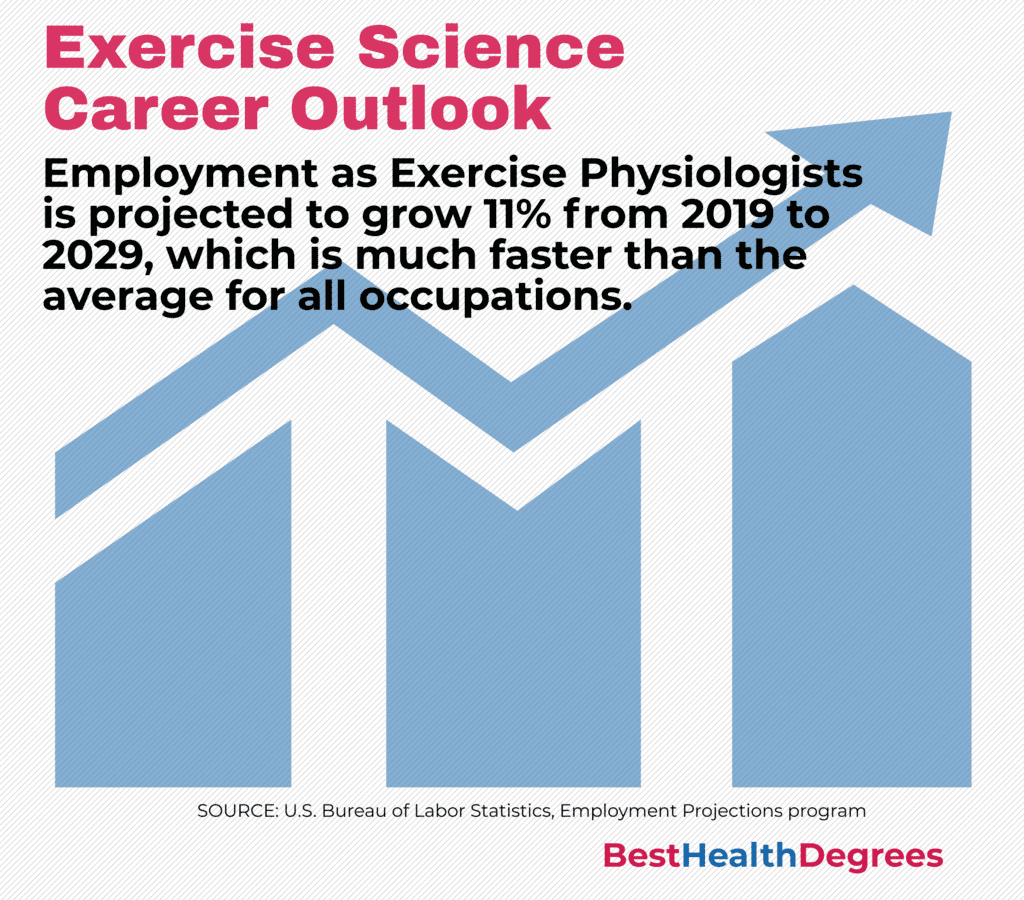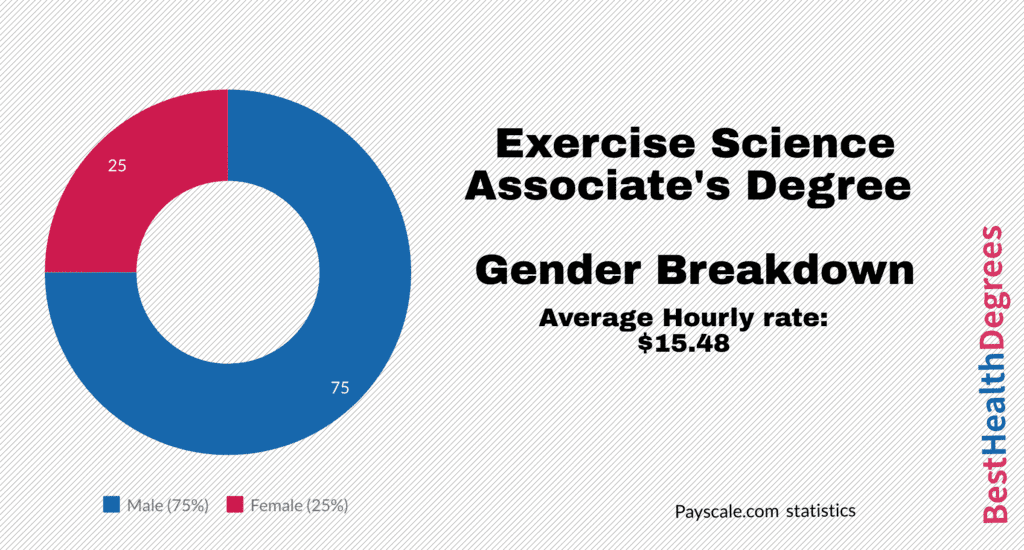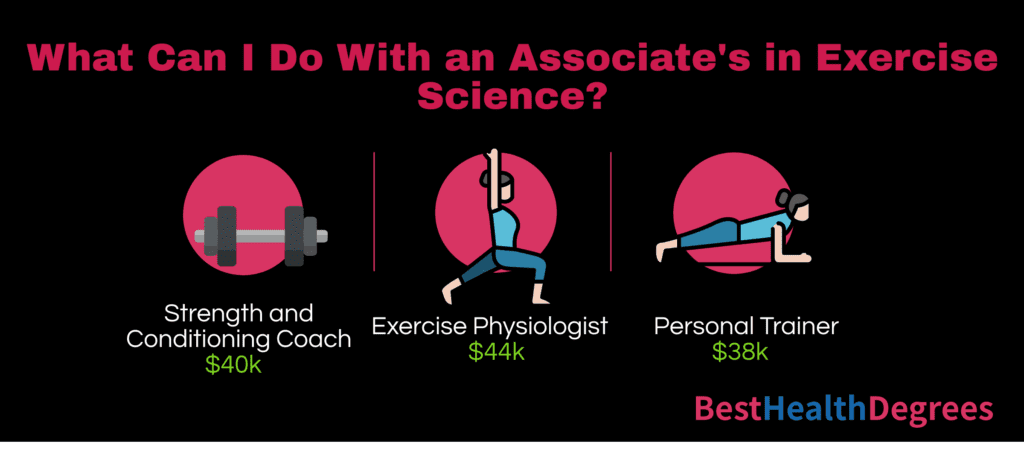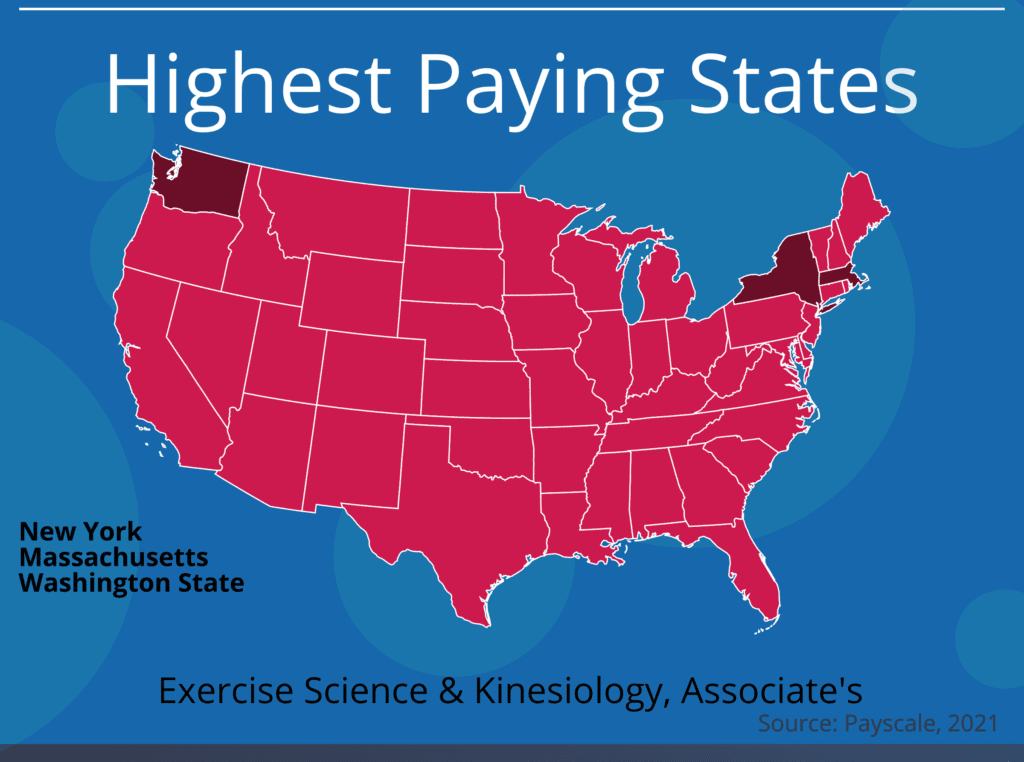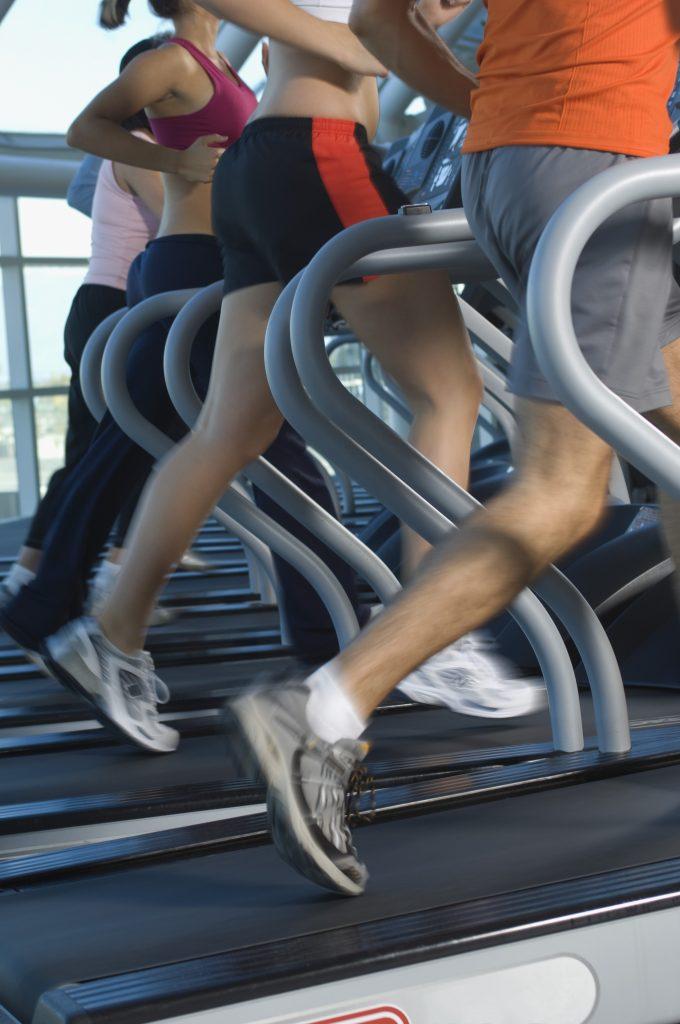Key Takeaways:
- Graduates with an associate degree in Kinesiology and Exercise Science can pursue careers such as fitness trainers, exercise instructors, and physical therapy aides.
- Salaries for these positions vary, with fitness trainers earning a median annual salary of around $40,000 and physical therapy aides earning about $28,000.
- Higher earning potential and advanced career opportunities are available with additional certifications or further education in related fields.
An Exercise Science salary with an associate degree is based on education, experience, and also geographic location. The importance of fitness in overall health is growing. And, a career change in kinesiology and exercise is a great choice. An associate degree in exercise science and kinesiology can be a fast, low-cost way to start a great career.
What is Kinesiology and Exercise Science?
The field of kinesiology studies how movement, performance, and function affect overall health. Kinesiology is defined as the academic discipline and study of how physical activity impacts one life and health. Exercise science focuses on the many underlying mechanisms and factors that impact exercise and how humans adapt and respond to exercise.
What is the Difference Between Kinesiology and Exercise Science?
The field of exercise science is a subfield of the broader field of kinesiology. It focuses on the health impact and changes to the human body when exercising. In contrast, kinesiology focuses on the various aspects of mechanics in motion and movement.
Both kinesiology and its sub-subject exercise science offer a wide variety of appealing occupations to professionals of all ages. Individuals who understand the benefits of an active lifestyle and have fitness interests gravitate to this field. Both kinesiology and exercise science are similar and focus on a combination of performance and exercise. However, they have definite distinctions that students should understand to best determine the academic path to reach their goals.
Accreditation for Exercise Science & Kinesiology
The most direct way to determine the quality of post-secondary education is to determine if the school or the program has regional or specialized accreditation. The accreditation process denotes if the academic degree or higher learning institution has met the educational standards established by the federal government at the federal level or a sanctioned accrediting agency at the industry level. Accreditation reviews the school or program, including academic, competency curriculum, and faculty. Then it evaluates if the program or school meets the criteria it is awarded accreditation.
Regional Accreditation
The process of regional accreditation is given to six agencies based on their location within the country. These Council for Higher Education Accreditation (CHEA) agencies aim to review and issue accreditation to the entire institution of higher education, rather than schools and colleges within the university and college.
A United States Department of Education (USDE) regionally accredited school offers each student the level of certainty they need if they plan to transfer credits to another school or want to earn a more advanced degree after completing their current academic program.
Specialized Accreditation
In the world of accreditation for exercise science and kinesiology, the Committee on Accreditation for the Exercise Sciences (CoAES) is the primary agency tasked with the responsibility of accrediting programs at the associate, baccalaureate, and master’s degree levels, plus several international programs.
The Committee on Accreditation for the Exercise Sciences (CoAES)
Established in 2004, the CoAES works under an agency that accredits allied health academic degrees, the Commission on Accreditation of Allied Health Education Programs (CAAHEP). It sets industry standards for students preparing for health, exercise, and fitness careers. The CoAES accredits both departments and programs related to exercise science, kinesiology, and physical education.
Types of Exercise Science and Kinesiology Associate’s Degree Programs
Those interested in studying for an associate exercise science degree or an associate degree in kinesiology are likely interested in pursuing a career in fitness, health awareness, physical education, or sports management, among others.
An associate degree in kinesiology and exercise science on-campus or an associate degree in exercise science online is an excellent option for those who wish to find entry-level exercise science jobs. And some find a position in a career related to kinesiology or fitness science. It typically takes one to two years to complete, depending on the student’s course load. Individuals who already work for a company and need money to pay for school should ask employers about assistance programs for tuition.
What Do You Learn?
Schools that offer kinesiology and exercise science associate degree programs provide degree candidates with a comprehensive overview of the fundamental principles. Below are some classes.
- Movement and movement’s function
- The Biomechanics of Movement
- Basic Health Education
- Muscle Structure and the Human Body
- Introduction to Kinetics
- Human Anatomy & Physiology
- Introduction to Athletic Training
- First-Aid and CPR
- Introduction to Nutrition
- Exercise Physiology
What Jobs Can You Do
Degree candidates who have completed an associate exercise science degree or an associate degree in kinesiology spend their days evaluating client injuries and developing rehab programs to help heal them. Graduates also implement client fitness assessments and develop programs to improve their fitness, help prevent future injuries, and help clients recover from an injury. Or, they may also choose to specialize their fitness career in other subtopics of weight loss or strength training.
Graduates with an exercise science degree enter the workforce as fitness instructors, consultants, or personal trainers. An exercise science degree grad may also choose a career as a high school coach. Or they may become an occupational therapy assistant, a physical therapist assistant, or a massage therapist, which requires additional training and education.
Entry-level positions available in the field of exercise science often include assistantships to professionals. During these experiences, individuals gain hands-on experience working directly with clients under the supervision of more experienced exercise science professionals. A sports psychologist or occupational therapist practice are common places to find these roles and advance a fitness career.
Many exercise science associate degree online graduates choose to pursue their baccalaureate degree in a variety of fields like physical therapy or work as exercise physiologists. Or, some choose to continue with a health and fitness master’s degree or another more advanced degree. Below are some common exercise science associate degree jobs and kinesiology associate degree jobs.
- Physical Education
- Dance Instructor
- Occupational Therapy Assistant
- Health Administration
- Physical Therapy Assisting
- Coaching
- Health Education
- Health Policymaking
- Mental Health Services
- Informatics
- Massage Therapy / Massage Therapist
- Sports Management
- Chiropractor
Jobs that Require Additional Education
Many exercise science occupations related to kinesiology may require a license mandated by each state. With additional education, professionals can take on many other roles.
Individuals can also advance by earning a master’s or doctorate in occupational or physical therapy. They can become managers at fitness centers, athletic directors, a recreational therapist, or even an orthopedic surgeon.
Kinesiology & Exercise Science Certification and License Options
Certifications require additional education but offer a wide variety of specialties. The various opportunities discussed below allow students to further specialize in either an exercise technique or a specific population. Certification is essential since these professionals recommend exercises to increase athletic performance and reduce injuries. They may also develop treatment plans for individuals with chronic conditions or to help patients recover from injuries.
National Strength & Conditioning Association (NSCA)
This group advances the profession and professionals working in the strength and conditioning industry. The NSCA offers a variety of certificate options. One is the Certified Personal Trainer (NSCA – CPT), which requires applicants to have a high school diploma (or its equivalent), be 18 years old, and be certified in CPR and AED training. Professionals who hold the CPT educate and motivate clients to help improve their fitness, wellness, and overall health. Those with an NSCA–CPT designation can also respond to medical emergencies.
Additionally, the NSCA offers a Certified Strength & Conditioning Specialist (NSCA – CSCS) certification for those who wish to apply scientific knowledge in athletes’ training to improve their performance.
The Tactical Strength and Conditioning Facilitator certificate (TSAC -F) is for professionals who wish to physically train emergency personnel, law enforcement, and other protective and first responder services.
Another certification is the CERTIFIED SPECIAL POPULATION SPECIALIST (NSCA – CSPS). It offers professionals the skills to train specialized portions of the general population about their fitness and health needs.
American College of Sports Medicine (ACSM)
Another professional organization that offers kinesiology and exercise science certification programs is the American College of Sports Medicine. The Certified Exercise Physiologist (ACSM – EP-C) possesses advanced skills in interpreting physical fitness and related assessments and developing exercise plans for physically challenged and healthy individuals. Emergency response certifications are required, as is a bachelor’s degree in kinesiology or exercise physiology.
This Certified Group Exercise Instructor (ACSM – GEI) certification is ideal for those individuals who enjoy motivating and teaching others in group environments, plus support outside the classroom. Certified Group Exercise Instructor professionals employ motivational and educational techniques that help create positive experiences.
The CERTIFIED CLINICAL EXERCISE PHYSIOLOGIST (ACSM – CEP) designation from the American College of Sports Medicine seeks to improve their client’s life daily. Their ultimate goal is to increase clients’ likelihood (those challenged with pulmonary, metabolic, or cardiovascular disorders) of independence from a social and physical perspective. Applicants for this credential must hold a minimum of a baccalaureate degree, plus relevant clinical or hands-on experience.
the Clinical Exercise Physiology Association
The Registered Clinical Exercise Physiologist (ACSM – RCEP) credential is offered by the CEPA (the Clinical Exercise Physiology Association), an American College of Sports Medicine affiliate. Those who hold this designation work within a team of healthcare professionals who work together to oversee the programs for individuals afflicted with specific disorders or physically limited. Applicants for this designation must possess a master’s level degree in a specific related field.
CERTIFIED INCLUSIVE FITNESS TRAINER (ACSM – CIFT) professionals have unique skills and work with individuals with physical limitations or other health risks. The CIFT credential is in conjunction with the National Center on Health, Physical Activity, and Disability, and the skills align with the Americans with Disabilities Act (ADA).
Careers in Exercise Science
Are you seriously considering one of the various careers in exercise or kinesiology? If so, it is vital to be sure to understand the answers to these critical questions about jobs and occupations.
- What Can I Do With an Associate Exercise Science Degree?
- Are exercise science associate degree jobs available that meet your average salary and base salary expectations?
- What kinds of associate degree in exercise science jobs are available in your area?
- Where can I locate a list of careers in kinesiology and exercise science?
Those who graduate with an associate exercise science degree or kinesiology degree will soon realize there are many available jobs. Graduates with associate degrees find entry-level jobs that offer many opportunities.
Exercise Science and Kinesiology Jobs
Associate degree programs prepare graduates for a fitness career. These exercise science professionals can find various jobs, careers, and exercise physiologists employment.
- Personal Trainers
- Athletic Class Leaders
- Fitness instructors
- Fitness Consultants
- Massage Therapists
- Occupational Therapist
- Sports Psychologist
- Recreational Therapist
Many graduates with an associate degree go on and pursue a bachelor’s degree. A more advanced master’s degree improves job options, responsibilities, and base average salary compensation. Physical therapy, nutrition, and other higher-order careers can start with an associate in kinesiology.
Exercise Science Average Salary and Job Growth
In 2021, nearly 309,800 fitness trainers, coaches, and instructors worked in the United States. The Bureau of Labor Statistics (BLS) reports the median annual base pay for fitness trainers and instructors is $40,700, or $19.57 per hour. The range of salaries is $22,960 to $75,940. In addition, the BLS expected job growth for these professions to be much faster than the average at a rate of 39% from 2020 to 2030.
As companies and industry organizations across the country recognize the benefits afforded to those participating in health and fitness programs, the need for fitness trainers & instructors will continue to outpace the average of other jobs.
Average Salary by Location
To fully understand the compensation for exercise science majors, review the associates degree in exercise science wages and percentile wages for exercise trainers or group fitness instructors. (BLS)
| Percentile | Average Salary Data |
|---|---|
| 10% | $21,640 per year |
| 25% | $27,840 per year |
| Median – 50% | $40,510 per year |
| 75% | $57,490 per year |
| 90% | $76,550 per year |
Below are the states that offer the highest exercise science associate degree average salary.
| State | Median Annual Income |
|---|---|
| Connecticut | $63,140 per year |
| Vermont | $58,580 per year |
| Washington, DC | $57,790 per year |
| New Jersey | $56,980 per year |
| Washington | $55,110 per year |
The states that offer the highest level of employment reported by the BLS.
| State | Number of Positions | Average Salary Data |
|---|---|---|
| California | 32,390 | $54,770 per year |
| Texas | 17,970 | $43,200 per year |
| New York | 16,310 | $53,710 per year |
| Florida | 13,920 | $28,470 per year |
| Illinois | 12,120 | $47,610 per year |
Below are the metropolitan areas that offer the highest exercise science associate degree salary.
| metropolitan areas | Average Salary Data |
|---|---|
| New Haven, CT | $81,080 per year |
| Charleston Area, SC | $73,190 per year |
| Modesta, CA | $68,390 per year |
| Bridgeport/Norwalk/Stamford, CT | $65,590 per year |
| Ventura – Thousand Oaks, CA | $64,590 per year |
| San Jose – Sunnyvale, CA | $ 64,210 per year |
| Burlington Vicinity, VT | $63,410 per year |
| San Francisco – Oakland, CA | $62,930 per year |
| Salinas, CA | $62,500 per year |
| Santa Rosa, CA | $50,740 per year |
Below are the non-metropolitan areas that offer the highest exercise science degree average salary.
| non-metropolitan areas | Average Salary Data |
|---|---|
| NE South Carolina Non-Metro Area | $59,900 per year |
| N Missouri Non-Metro Area | $53,520 per year |
| NY Capital Region Non-Metro Area | $53,440 per year |
| Nevada Non-Metro Area | $53,220 per year |
| Southern Vermont Non-Metro Area | $51,690 per year |
Professional Organizations in Exercise and Kinesiology
Professional organizations offer a voice of advocacy and support for the companies and professionals working in the industry. For professionals in kinesiology and exercise science, there are many professional organizations to join that will help bolster one’s career in professional organizations.
- Job Boards
- Networking Opportunities
- Continuing Education
- Publications & Other Resources
- Awards & Recognition
- National and Regional Conferences/Seminars
- Advocacy and support, to name a few.
While many memberships require annual dues, the available benefits far exceed the financial commitment required by professional organizations. Professionals have the below organizations to consider.
American Kinesiology Association (AKA)
The AKA promotes and enhances the kinesiology occupation. It offers a variety of professional benefits to its members, including access to publications, events, and services and a comprehensive career center. The AKA offers a variety of levels of members and offers several awards to deserving recipients.
The American Kinesiotherapy Association
As a voice and advocate for the kinesiotherapy profession, the American Kinesiotherapy Association seeks to improve the standards of care through education opportunities and legislative endorsements. This association is an affiliate organization of the AKA.
American Society of Biomechanics (ASB)
The ASB comprises hundreds of nationwide members, including clinicians, orthopedic surgeons, scientists, researchers, faculty, and students. They seek to increase access to accurate information regarding health science, exercise science jobs, and ergonomics.
The American College of Sports Medicine (ACSM)
The ACSM is an organization for the professions of exercise and sports medicine. ACSM’s ethos concerns the development, integration, and advancement of scientific research in providing education and practical applications in sports medicine and kinesiology.
National Athletic Trainers’ Association
The National Athletic Trainers’ Association is a professional organization with a worldwide membership. Its mission is to enhance athletic trainers’ quality of care provided to clients. There are two tiers of membership. One is for students and professional membership, and the other is for non-students.
American Physical Therapy Association
The American Physical Therapy Association APTA is an excellent option for students and professional degree holders interested in a career as a physical therapist. It has nearly 100,000 members, including physical therapists, exercise physiologists, physical therapist assistants, and students.
National Academy of Kinesiology (NAK)
Established as an affiliate of the AKA, NAK is an honorary organization of those who have made significant contributions to areas of physical education and kinesiology. Members work to promote educational opportunities in the science of physical activity and human movement. In addition, the NAK has over 500 members.
Related:
